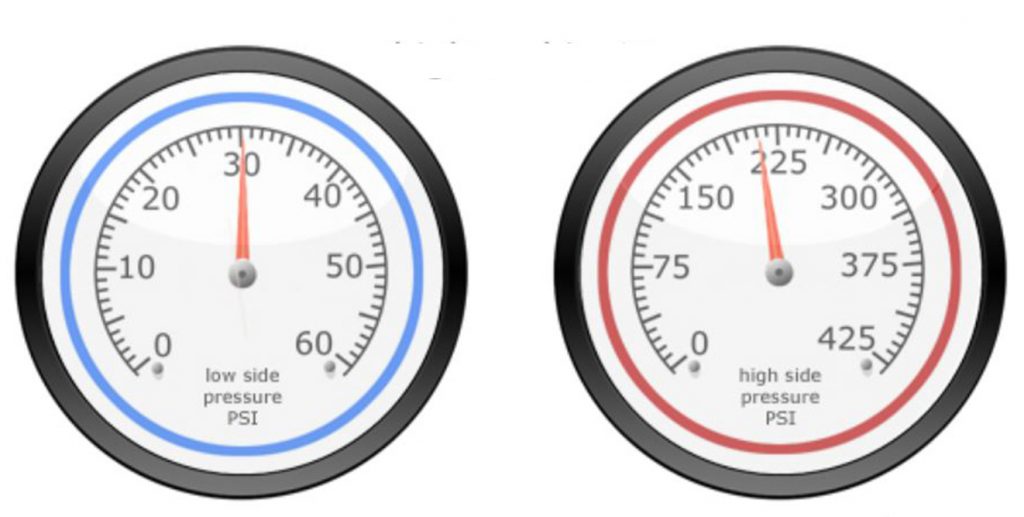A lot of drivers are used to buying coolants themselves to top up their car’s AC system, and they observe later that the gauges that come along are unreliable.
Most times they might read incorrect pressures, or sometimes the gauges may even seem to freeze, which might make you inaccurately read the level of coolant you put inside the AC system.
This is the reason you need professionals to do this, as they will ensure accurate readings and avoid problems while refilling the AC system.
In this article I will discuss the overcharged ac system gauge readings, how do you know if your car ac is overcharged, what are the symptoms of an overcharged AC system, can overcharging car AC damage compressor, how to bleed off an overcharged car AC, how to fix overcharged ac and finally what should ac pressure be with the engine off. So with those in mind let’s get started.
Related article: 3 Ways To Know How Much Gas You Have With a Broken Fuel Gauge
Overcharged Ac System Gauge Readings
Any A/C system that’s properly working should read 150 PSI when on the high side, while 30 PSI on the low side.
Below is the list of pressure readings your car A/C:
- If it shows 250 PSI / 30 PSI, it means you have air somewhere in the system.
- If it shows 250 PSI / 50 PSI, it means the condenser is not cooling and the system is overcharged. Meaning condenser may be blocked.
- If it shows 225 PSI / 80 PSI, it could be that the expansion valve is likely open too wide. This could also mean you have lots of refrigerant in the system.
- If it shows 200 PSI / 70 PSI, it means that there is some blockage in the system which might be either before or at the expansion device.
- If it shows 160 PSI / 10 PSI, it means that the evaporator could be frosted, a faulty low pressure pipe, or clogged expansion valve.
- If it shows 150 PSI / 30 PSI, it means that there is water in the system.
- If it shows 150 PSI / >10 PSI, it means that there could be leakage somewhere in the system or your expansion valve might be stuck open.
- If it shows 125 PSI / 30 PSI, it means the system might be uncharged or there’s too much oil in the compressor.
- If it shows 100 PSI /100 PSI, it means you have a burnt coil or your compressor is not engaging due to insufficient power coming to it.
- If it shows 50 PSI / 50 PSI, it means the clutch is not engaging.
Related Article:
How Do You Know If Your Car Ac Is Overcharged?
Any AC system that’s properly working should be able to come up immediately after the button is pressed. But in case the vehicle has been off for a while, the AC system might start between one to two minutes.
However, anything beyond two minutes could mean that the AC system is broken or will soon be. Below are how to know if your car ac is overcharged.
- Faulty Cooling
- Noisy or Broken Compressor
- High Pressure
- Failing Engine
What Are The Symptoms Of An Overcharged AC System?
You need to verify if your car AC has been overcharged before fixing it.
Here are few symptoms of an overcharged AC
- Inefficient Cooling
- Compressor Noise
- High Pressure Readings
- Struggling Engine
- Broken Compressor
What should ac pressure be with engine off
When your car engine is off the acc pressure on the low sides will usually be at around 25 to 40psi and sometimes the high side can up to about 200 psi.
Can Overcharging Car AC Damage Compressor
Anytime you overcharge your AC, it could cause permanent compressor failure, which happens to be the pump for the refrigerant.
It also means that the changing from liquid to gas will not happen, meaning that the compressor will begin to produce liquid coolant instead of gas.
This is because it will be working extremely hard to pump the excessive coolant through the lines.
How To Bleed Off An Overcharged Car AC
One of the best ways to bleed off an overcharged car AC is to handle the AC carefully. This is because the refrigerant needs careful maintenance.
So to do this, just ensure you create a vacuum on it, and then carefully eliminate the Freon from the AC.
Once the Freon is eliminated, then you can put it to a closed container, and it will help AC dispose of properly.
How To Fix Overcharged Ac
Remember, refrigerant is known to be a very dangerous chemical. My advice to you is to get an auto mechanic that will help in taking some of the coolants out from the system and return the AC to its normal pressure.
This is because mechanics know the best practices. But a layperson will not know what to do before attempting to remove the coolant.
Here is how the Mechanic Fixes Overcharged AC
An auto mechanic utilizes a machine that incorporates the airtight seals and vacuums to bleed the coolant from the AC.
So it is the duty of the equipment to take off the refrigerant safely. Note that it is an enclosed system.
This takes the coolant in a container to recycle or reuses it later. But whatever the case should be, it retains the chemical out of the environment.
Note that one end of the machine must be attached to a high-pressure port, while another end will be attached to its low-pressure port.
An auto mechanic will utilize a gauge to find out how much of the coolant is in the system which will be based on the pressure readings.
Then the machine will be allowed to run till the pressure reading shows the normal amount of refrigerant that’s available in the system.
This means that as the pressure lowers, that’s how the temperature lowers too; and as the temperature decreases, that’s how this will causes the pressure to fall in the system.
But remember that the main purpose here is to lower pressure. So this prevents the compressor from working too hard to pump coolants via the lines and not stress the entire system into malfunctioning.
However, most mechanics will charge you between $200 and $300 to recharge your AC systems.
Though lots of them will charge slightly lower than this amount to discharge it. But the reason the price will be lower is due to the fact that they won’t be buying coolant with this procedure.
So this means that the expected cost to discharge your AC system will be about $150 to 250.
Though there might be slight price differences due to the car’s make, year, and model.
Conclusion
Putting too much coolant in your car AC won’t make it cooler. Some of the results of adding coolant to an AC is that it blows no air, hot air, or little air.
Remember that coolants are hazardous chemicals, which should be handled by your mechanic.
- How to Fix an Inaccurate Fuel Gauge
- How often Does Car AC Need to Be Recharged?
- How Much Does it Cost to Remove Freon from a Car?
Hi dear, I am Gift Dennis I have been working as a Radiographer for over 8 years, but I switch my profession to what I love which is auto body part repairs and I recently got my automotive diploma last August 2020 as an auto-body repair technician. I love fitness and everything about cars, so here is where I share my expertise and experiences with those who wish to hear about them.


